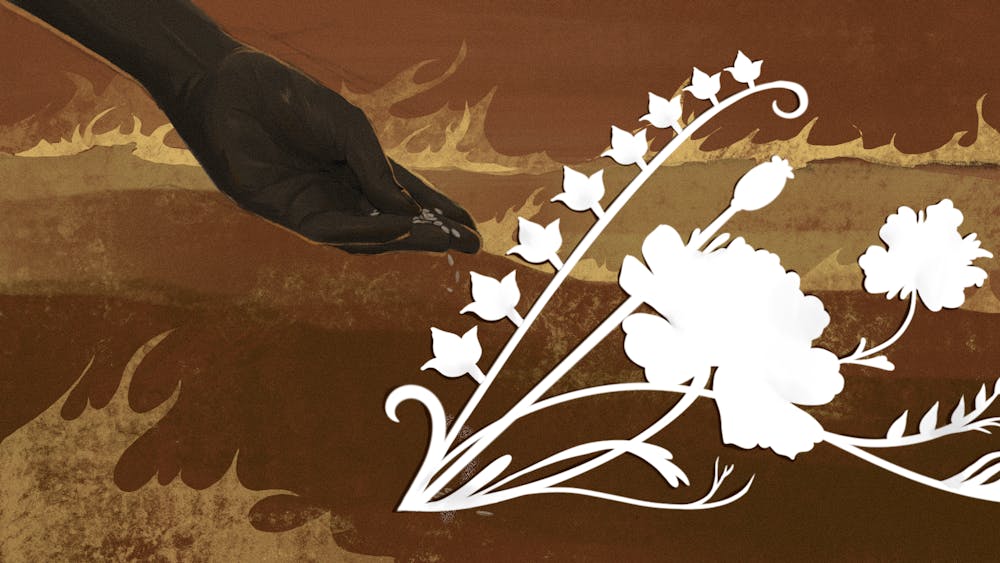The climate change apocalypse in Octavia Butler’s Parable of the Sower is frighteningly tangible. Written in 1993, the novel is presented as a series of journal entries beginning in 2024, which tell the story of Lauren Oya Olamina as she navigates a particularly tumultuous period of American history. Journalists will come to describe this era as “accidentally coinciding climatic, economic, and sociological crises,” literally coining it “the Apocalypse” (or “Pox” for short).
Our parable opens on a bleak image of Robledo, Calif., Lauren’s relatively affluent neighborhood. “Relatively” does a lot of work here, as the residents of this Los Angeles suburb scratch out a living behind a massive wall meant to keep out the hungry, crazy “street poor.” In the Pox, fresh water is a treasured commodity, crime is a given, and jobs are nigh impossible to come by. Still, the residents of Robledo cling onto their old lives, dreaming of a return to the good old days even as the nation descends further into anarchy. Families lend each other resources, temporary shelter, and neighborly gossip. All the while, news of pyromania–inducing drugs and growing instability reach the townspeople, who continue to compartmentalize the issue as an outside problem.
Meanwhile, we learn that Lauren has been putting together plans for the inevitable collapse of Robledo. We even learn through her journals of the religion she has started to develop, coined “Earthseed.” Each chapter is prefaced by a passage from Lauren’s self–written holy texts. The daughter of a pastor, Lauren chafes under the antiquated rituals and expectations of her father’s faith, instead turning to Change as her God, the dominant power in her universe. At 15 years old, she is already writing passages that refine her vague belief in Change to a holy text, which teaches her future disciples to navigate the Pox without becoming complacent, myopic, or nostalgic.
When outsiders inevitably raze her neighborhood, Lauren must brave a world she has prepared her whole life for but never properly known. What’s more, she must do so while hiding a secret: She is afflicted by “hyperempathy,” feeling the sensations, both pain and pleasure, of any living person she sees. While hyperempathy may seem initially like a unique power, it means that as part of the street poor, she must act ruthlessly—killing, rather than wounding, any assailants.
A striking feature of the Pox is its normalcy. Butler does not sell us a romanticized view of apocalypse, with joyous last hurrahs, agrarian lifestyles, or rugged–yet–principled survivalists. Her America is filled with the industrial complexes, desperate behaviors, and politics that make the Pox a believable period of history. At chain supermarkets, Lauren must buy such unglamorous things as water purification tablets and tampons (under armed guard, of course). On the road, she must join a growing wave of street poor on the journey north, in blind search of greener pastures without the drugs or droughts of Los Angeles. And in the outlying hills, Lauren must band together with her small group of survivors to fend off wild dogs, criminals, and the odd cannibal.
Critics of Butler’s novel cite its uncharismatic storytelling, with unchanging characters and a relentlessly bleak plot, as reasons to set it down. When I asked, a friend described it as “competency porn,” and this takeaway is valid if you are looking for a character–driven, coming–of–age story. Lauren starts out as a remarkably cynical 15–year–old and ends as the same depressing, slightly older know–it–all. With few exceptions, she makes a prediction about the future, complains about the myopia of those around her, and turns out to be right. The plot seems to reward this obnoxious pattern ad infinitum.
The parable’s biggest supporters, however, point without fail to Butler’s apparent clairvoyance, her uncanny prescience as she so accurately holds a mirror to our cultural moment. I must confess this takeaway irritates me. To laud the author’s intelligence and bash capitalism, partisanship, insufficient group organizing, or whatever other specters haunt the merry–go–round from hell is to miss the point of Butler’s novel. Parables are written as lessons, not predictions, so what universal insight did Butler want to pass on? The one I find most relevant today is the frightening ease with which we settle into new normals. Big deals that quickly become yesterday’s news—the price of eggs, the newest war, the report that this year’s glacier melt, wildfire, hurricane, or drought was the worst on record—become the background buzz to classes, then vacations, then internships, to the unfounded belief that we are too big to fail.
And then, once something finally gives, we must settle into a new normal. I was shocked at the ease by which Lauren’s day–to–day took on a steady rhythm after she escaped the burnt ruins of Robledo—walk north, sleep, take watch, count pennies, buy things and kill people, continue walking north. Audaciously, I relate the possibility of graduating without a job—shock, then shame, then an inevitable yet unimaginable life afterward—to the fall of Robledo and the grueling interstate. How must it feel to fall off track, to lose the reassurance of upward mobility that has given me the base confidence to navigate life? And if the ground does open up beneath me, how will I abide? While a far cry from the gore and horrorfest of Butler’s Pox, the very real possibility of unemployment and purposelessness never fails to bring me fresh waves of panic.
In the midst of our brief personal apocalypses, I believe we must act a little like Lauren—however obnoxious it may sound, we must know better. When the walls come crashing down, Parable of the Sower teaches us how to survive the fallout.

